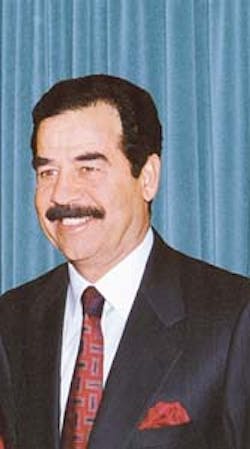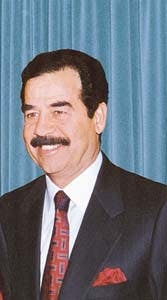Continuing U.S.-Iraq acrimony ensures sanctions will linger
David Knott
Senior Editor
Prospects for a lifting of sanctions against Iraq are as bleak as ever, given the tone of acrimony between Baghdad and Washington, D.C.
Opposition by the U.S., as well as the U.K.-both with veto power on the U.S. Security Council-ensures the sanctions will remain in place.
Saddam's stance
Iraq's President Saddam Hussein continues to use the U.S. government's tough line on maintaining embargoes against Iraq to bolster his regime in Baghdad.
Late in March, Saddam accused the U.S. of genocide during a cabinet meeting ostensibly intended to persuade ministers to cut spending.
Saddam was quoted by Baghdad newspapers, edited by his son Uday, as saying "I believe American capitalism creates problems and genocide campaigns and starvation.
"As for Arabs, they have to be torn to pieces as a nation, their culture and civilization obliterated and wealth pillaged, so that America would control energy markets in the world."
Albright's stance
U.S. Sec. of State Madeleine Albright gave a speech at Georgetown University on Mar. 26 that suggested there was a long way to go before Washington's line on Baghdad could soften.
For sanctions against Iraq to be lifted, Albright said under U.N. resolutions, Baghdad must: cease making weapons of mass destruction and destroy any such existing weapons; cooperate with the U.N. inspections and monitoring regime; recognize the border with Kuwait; return stolen property; account for prisoners of war; end support for terrorism; and stop brutalizing Iraqi people.
"The food-for-oil deal now in place is designed to ease the suffering of civilians throughout Iraq," said Albright. "It is not related to the larger question of when and if the overall sanctions regime will be lifted.
"Nor is the continuation of this arrangement automatic, however strongly we support its purpose. If we see evidence that the government of Iraq is not living up to its promises with respect to implementation, the experiment will cease."
Aid distribution begins
Meanwhile, Iraq's government has begun distributing to civilians food rations bought from oil sales under the U.N. scheme.
Distribution is being supervised by U.N. officials.
The first shipment arrived in Iraq late in March, 3 months after oil exports began. Baghdad blamed the U.S. for the delays and complained to the U.N.
Some countries, notably France, Russia, and China-which all have companies shortlisted for big development projects-have proposed lifting U.N. sanctions to relieve the suffering of Iraqi civilians (see related story, p. 19).
There are also factions within the U.S. keen to have the government's line on sanctions lightened, so U.S. oil companies do not miss out on Iraqi projects.
Although U.S. companies are among the buyers of Iraqi oil under the U.N. program-and U.S. firms have been negotiating with the Iraqis over new projects-it appears U.S. oil companies are falling behind in securing development opportunities in Iraq.
Iraqi President
Saddam Hussein"I believe American capitalism creates problems and genocide campaigns and starvation. As for Arabs, they have to be torn to pieces as a nation, their culture and civilization obliterated and wealth pillaged, so that America would control energy markets in the world."
U.S. Sec. of State
Madeleine Albright"The food-for-oil deal now in place is designed to ease the suffering of civilians throughout Iraq. It is not related to the larger question of when and if the overall sanctions regime will be lifted. Nor is the continuation of this arrangement automatic, however strongly we support its purpose. If we see evidence that the government of Iraq is not living up to its promises with respect to implementation, the experiment will cease."


